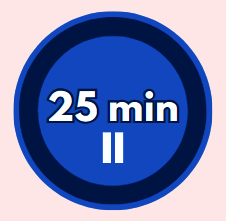Time management is essential for efficiency and success and balancing productivity and relaxation. Knowing when to focus and when to rest can make a huge difference in overall well-being and productivity.
Schedule your Tasks

Growing up, I struggled with managing deadlines and schedules. I found it difficult to keep track of everything I needed to do, leading me to feel overwhelmed. I realized I needed a tangible, visual plan to stay organized. I started creating a visual schedule with all my classes and activities and posted it on my wall. Every morning, I would look at this schedule to help me memorize my day. Knowing the exact time and place for each activity helped me feel more prepared and enabled me to be punctual.
Find a Balance

Everyone has unique perspectives and experiences with time management. Some people are naturally adaptable and can easily adjust to changes in their routines, while others, like me, need a structured system to stay on track. When starting college, time management becomes even more essential as you become the master of your time. There are no teachers, parents, or coaches telling you when to do things. There will be times when you have to make tough choices, such as choosing to hang out with friends or finishing an assignment. However, if you schedule your week thoughtfully, you should be able to find a balance.
Find your Rhythm

One of the most valuable tips for improving time management is identifying the times of day when you’re most productive. Personally, I am not a morning person, so I tend to get my best work done at night, specifically, between 6 and 9 p.m. I am more focused and achieve better results than I would during the morning or early afternoon. Analyzing when you work best helps you set aside specific times for studying and completing assignments based on your natural rhythms.
Prioritize

Another way to organize your time is prioritizing tasks. Identify the most important things in your life and arrange them accordingly for effective time management. After you have determined your priorities, creating a weekly schedule can give you a clear view of how your week will look. Setting a routine where you update your schedule each week helps you prepare for upcoming tasks and deadlines. If you have a major project due, dividing the work into smaller, manageable portions throughout the week can reduce stress and help you stay on track.
Start Small

If you find yourself procrastinating, try the Pomodoro Technique. In this technique you will focus on one task for 25 minutes, or however long your attention span is, and then take a five-minute break. You repeat this cycle for either a set amount of time (one hour) or until a specific time in the day (3 p.m.), depending on your preference or schedule. During this time, you should turn off your phone or put a lock on it to ensure all 25 minutes are focused on the task. The first few minutes will be the hardest, but once you get into the groove, you will find that the time has flown by, and you can feel relieved by your break.
Time management is not a one-size-fits-all solution; it requires personalization and practice. But by exploring your productivity patterns, establishing priorities, and creating a schedule, you can build a system that works for you. Not only will this help you stay organized, but it will also make it easier to enjoy downtime guilt free. Developing this skill early on has long-term benefits, helping you succeed in both academic and personal pursuits, and setting you up for success in the future.
Kevin Herrera
International MBA student
UIS Soccer Player
Graduate Assistant - Marketing and Media Strategy



